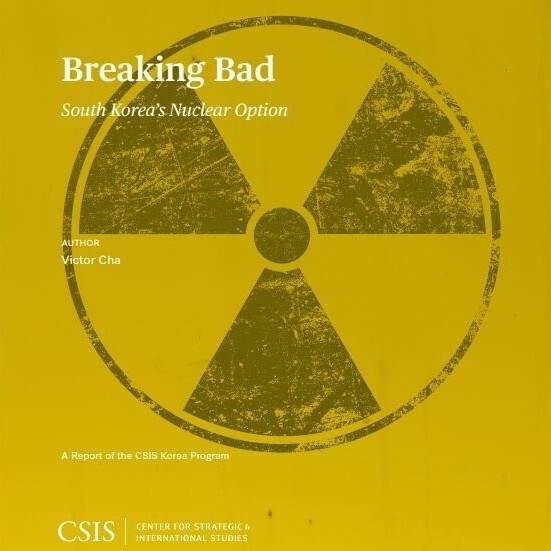hankyoreh
Links to other country sites 다른 나라 사이트 링크
1 in 3 S. Korean security experts support nuclear armament, CSIS finds

A US think tank survey has shown that only 1 in 3 South Korean national security experts favor autonomous nuclearization, a percentage significantly lower than that of the general public.
According to the results revealed on Monday of an opinion poll distributed by the Center for Strategic and International Studies (CSIS) to over 1,000 “strategic elites” — academics, think tank experts, business elites, legislators, and officials (current and former) — between January 15 and March 17, 2024, 34% favored nuclearization.
At the same time, 54% of those who believe that South Korea should acquire nuclear capabilities believe in South Korea’s autonomous and independent nuclearization, rather than nuclear sharing arrangements or the return of US tactical nuclear weapons.
Meanwhile, a combined 66% of those surveyed opposed (53%) or remained undecided (13%).
Of the strategic elites who expressed support for South Korea’s nuclearization, 68% self-identified as politically conservative/moderate conservative, while 22% identified as moderate and 10% identified as progressive/moderate progressive.
Out of those who oppose nuclearization, 36% were self-identified conservative/moderates conservative, 36% saw themselves as progressive/moderate progressive, and 28% referred to themselves as moderate.
“In the face of an uncertain security environment — precipitated by wars in Europe and the Middle East, China’s assertive behavior, and North Korea’s campaign to develop weapons of mass destruction (WMD) — South Korea has witnessed increasingly open discussion about the previously taboo topic of national nuclear weapons capability,” the report began. The taboo was also breached by President Yoon Suk-yeol’s comments on how South Korea was perfectly capable of developing nuclear weapons if it set its mind to it.
However, CSIS also concluded that the percentage of strategic elites who support nuclearization is significantly lower than that of the general public, the latter of which has been shown to support nuclear armament at a rate of up to 76% in certain opinion polls.
Of the South Korean strategic elites polled, 43% cited “international sanctions and reputational loss of status” in their opposition to nuclearization. Another 26% believed that nuclearization would “damage the US-South Korea alliance and possible fallout,” while 20% cited fears of “initiating nuclear arms race on the Korean Peninsula,” and 10% maintained that nuclearization would lead to “increased security threats from neighboring countries, especially China and Russia.”
The center analyzed that “the negative attitude held by South Korean strategic elites in regard to nuclearization is not unconditional,” stating that many of those who initially opposed a nuclear South Korea would change their minds if US security commitment to South Korea wavered.
In response to a question asking if one’s support for a nuclear South Korea would change if an “America First” policy returned to the White House in November 2024, 51% of those who were opposed to going nuclear stated that they would support the idea.
This shows that if former President Donald Trump is reelected and pushes for a reduction in US forces or a weakening of US extended deterrence, calls for nuclearization are likely to gain momentum among strategic elites.
By Lee Bon-young, Washington correspondent
Please direct questions or comments to [english@hani.co.kr]

Editorial・opinion
![[Column] When ‘fairness’ means hate and violence [Column] When ‘fairness’ means hate and violence](https://flexible.img.hani.co.kr/flexible/normal/500/300/imgdb/original/2024/0516/7417158465908824.jpg) [Column] When ‘fairness’ means hate and violence
[Column] When ‘fairness’ means hate and violence![[Editorial] Yoon must stop abusing authority to shield himself from investigation [Editorial] Yoon must stop abusing authority to shield himself from investigation](https://flexible.img.hani.co.kr/flexible/normal/500/300/imgdb/original/2024/0516/4417158464854198.jpg) [Editorial] Yoon must stop abusing authority to shield himself from investigation
[Editorial] Yoon must stop abusing authority to shield himself from investigation- [Column] US troop withdrawal from Korea could be the Acheson Line all over
- [Column] How to win back readers who’ve turned to YouTube for news
- [Column] Welcome to the president’s pity party
- [Editorial] Korea must respond firmly to Japan’s attempt to usurp Line
- [Editorial] Transfers of prosecutors investigating Korea’s first lady send chilling message
- [Column] Will Seoul’s ties with Moscow really recover on their own?
- [Column] Samsung’s ‘lost decade’ and Lee Jae-yong’s mismatched chopsticks
- [Correspondent’s column] The real reason the US is worried about Chinese ‘overcapacity’
Most viewed articles
- 1China calls US tariffs ‘madness,’ warns of full-on trade conflict
- 2[Column] US troop withdrawal from Korea could be the Acheson Line all over
- 3[Editorial] Yoon must stop abusing authority to shield himself from investigation
- 4[Column] When ‘fairness’ means hate and violence
- 5[Column] How to win back readers who’ve turned to YouTube for news
- 6US has always pulled troops from Korea unilaterally — is Yoon prepared for it to happen again?
- 7[Book review] Who said Asians can’t make some good trouble?
- 8Naver’s union calls for action from government over possible Japanese buyout of Line
- 9Could Korea’s Naver lose control of Line to Japan?
- 10[Editorial] Korea must respond firmly to Japan’s attempt to usurp Line